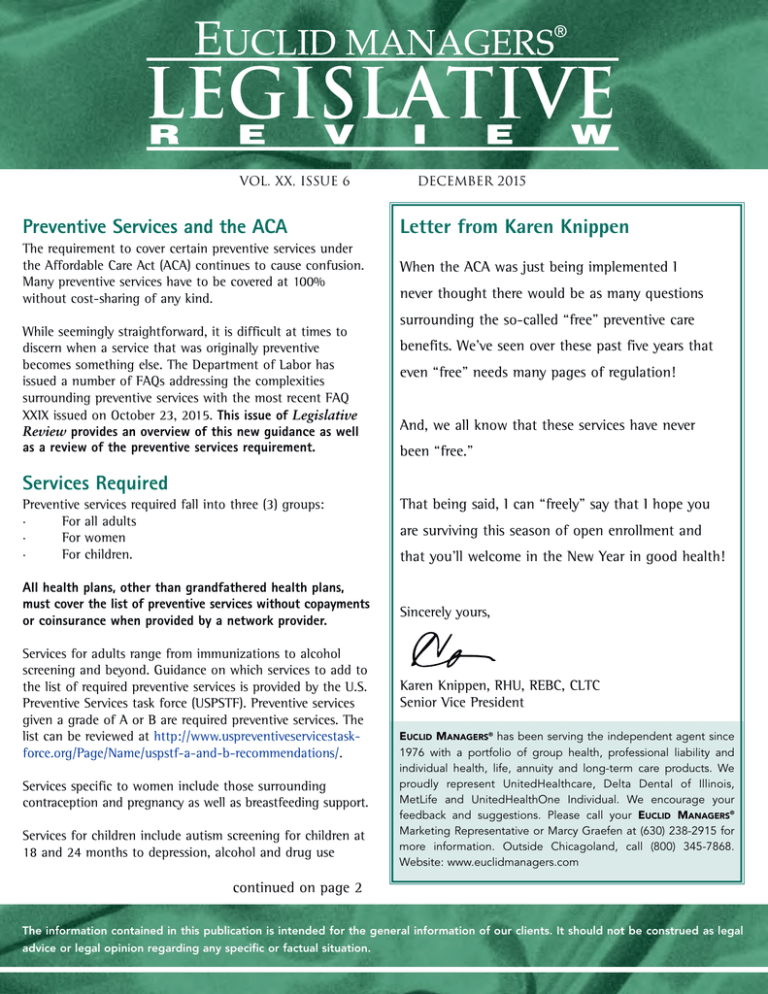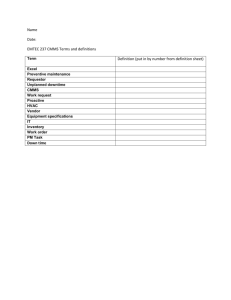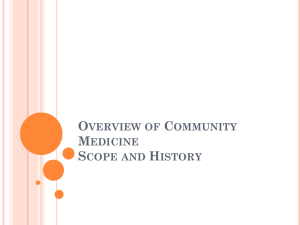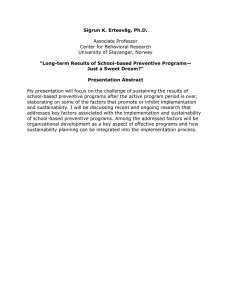Letter from Karen Knippen Preventive Services and the ACA
advertisement

VOL. XX, ISSUE 6 DECEMBER 2015 Preventive Services and the ACA Letter from Karen Knippen The requirement to cover certain preventive services under the Affordable Care Act (ACA) continues to cause confusion. Many preventive services have to be covered at 100% without cost-sharing of any kind. When the ACA was just being implemented I While seemingly straightforward, it is difficult at times to discern when a service that was originally preventive becomes something else. The Department of Labor has issued a number of FAQs addressing the complexities surrounding preventive services with the most recent FAQ XXIX issued on October 23, 2015. This issue of Legislative Review provides an overview of this new guidance as well as a review of the preventive services requirement. never thought there would be as many questions surrounding the so-called “free” preventive care benefits. We’ve seen over these past five years that even “free” needs many pages of regulation! And, we all know that these services have never been “free.” Services Required Preventive services required fall into three (3) groups: · For all adults · For women · For children. All health plans, other than grandfathered health plans, must cover the list of preventive services without copayments or coinsurance when provided by a network provider. Services for adults range from immunizations to alcohol screening and beyond. Guidance on which services to add to the list of required preventive services is provided by the U.S. Preventive Services task force (USPSTF). Preventive services given a grade of A or B are required preventive services. The list can be reviewed at http://www.uspreventiveservicestaskforce.org/Page/Name/uspstf-a-and-b-recommendations/. Services specific to women include those surrounding contraception and pregnancy as well as breastfeeding support. Services for children include autism screening for children at 18 and 24 months to depression, alcohol and drug use That being said, I can “freely” say that I hope you are surviving this season of open enrollment and that you’ll welcome in the New Year in good health! Sincerely yours, Karen Knippen, RHU, REBC, CLTC Senior Vice President EUCLID MANAGERS® has been serving the independent agent since 1976 with a portfolio of group health, professional liability and individual health, life, annuity and long-term care products. We proudly represent UnitedHealthcare, Delta Dental of Illinois, MetLife and UnitedHealthOne Individual. We encourage your feedback and suggestions. Please call your EUCLID MANAGERS® Marketing Representative or Marcy Graefen at (630) 238-2915 for more information. Outside Chicagoland, call (800) 345-7868. Website: www.euclidmanagers.com continued on page 2 The information contained in this publication is intended for the general information of our clients. It should not be construed as legal advice or legal opinion regarding any specific or factual situation. assessment for adolescents. The list of children’s preventive health services can be found at https://www.healthcare.gov/preventive-care-children/ FAQ XXIX The overview of the FAQ document restates the requirements for coverage of preventive services. It also carries the reminder that “If a recommendation or guideline does not specify the frequency, method, treatment, or setting for the provision of a recommended preventive service, then the plan or issuer may use reasonable medical management techniques to determine any such coverage limitations.” Lactation Services Q1: Are plans and issuers required to provide a list of the lactation counseling providers within the network? The short answer to this question is “yes.” Lactation counseling must be provided as a part of comprehensive prenatal and postnatal lactation support, counseling and equipment rental. Generally, the list of lactation counseling providers should be part of any listing of network providers or as part of a provider directory. Q2: My group health plan has a network of providers and covers recommended preventive services without cost sharing when such services are obtained in-network. However, the network does not include lactation counseling providers. Is it permissible for the plan to impose cost sharing with respect to lactation counseling services obtained outside the network? If a plan does not have in-network providers, then out-ofnetwork providers without cost sharing must be covered. However, if a plan does have in-network providers, then the rule that allows a carrier to limit preventive services at no cost to in-network providers prevails. Q3: The State where I live does not license lactation counseling providers and my plan or issuer will only cover services received from providers licensed by the State. Does that mean that I cannot receive coverage of lactation counseling without cost sharing? Plans must allow provision of these services by another provider type acting within the scope of their license or certification in such circumstances. -2 legislative review Q4: A plan or issuer provides coverage for lactation counseling without cost sharing only on an inpatient basis. Is it permissible for the plan or issuer to impose cost sharing with respect to lactation counseling received on an outpatient basis? No. It is not considered that this coverage limitation represents a “reasonable medical management technique.” Q5: Are plans and issuers permitted to require individuals to obtain breastfeeding equipment within a specified time period (for example, within 6 months of delivery) in order for the breastfeeding equipment to be covered without cost sharing? Services must be provided for the duration of breastfeeding assuming the individual remains covered by the plan. Obesity Q6: My non-grandfathered group health plan or coverage contains a general exclusion for weight management services for adult obesity. Is this permissible? Screening for obesity in adults must be covered by the plan. Also, the USPSTF recommends behavioral interventions for adult patients with specified high body mass index. The recommendations include: • Group and individual sessions of high intensity (12 to 26 sessions in a year) • Behavioral management activities, such as weight-loss goals • Improving diet or nutrition and increasing physical activity • Addressing barriers to change • Self-monitoring, and • Strategizing how to maintain lifestyle changes. Colonoscopy Services Q7: If a colonoscopy is scheduled and performed as a screening procedure pursuant to the USPSTF recommendation, is it permissible for a plan or issuer to impose cost sharing for the required specialist consultation prior to the screening procedure? Pre-colonoscopy screening must be included. Prior guidance was unclear in this regard. As such, this requirement applies www.euclidmanagers.com to plan years beginning on or after December 22, 2015 (60 days following publication of the FAQs). Q8: After a colonoscopy is scheduled and performed as a screening procedure pursuant to the USPSTF recommendation, is the plan or issuer required to cover any pathology exam on a polyp biopsy without cost sharing? Yes, these services are considered part of the preventive service as is removal of a polyp during the colonoscopy. This requirement also applies to plan years beginning on or after December 22, 2015 (60 days following publication of the FAQs). Contraception Q9: I am a qualifying non-profit or closely held for-profit employer who sponsors an ERISA-covered self-insured plan, and I have a sincerely held religious objection to providing coverage of contraceptive services. How do I effectuate the religious accommodation, relieving myself of any obligation to contract, arrange, pay, or refer for that coverage? There are two (2) methods to relieve a plan from this obligation: • Complete the EBSA Form 700 (accessible at www.dol.gov/ebsa/pdf/preventiveserviceseligibleorganizationcertificationform.pdf) and provide it to the plan’s third party administrator(s); or • Provide appropriate notice of the objection to the Department of HHS. A model notice is available at www.cms.gov/CCIIO/Resources/Regulations-andGuidance/Downloads/Model-Notice-8-22-14.pdf. Coverage of BRCA Mutations Q10: Which women must receive coverage without cost sharing for genetic counseling, and if indicated, testing for harmful BRCA mutations? Women found to be at increased risk using a screening tool designed to identify a family history that may be associated with an increased risk of having a potentially harmful gene mutation must receive coverage without cost sharing for genetic counseling, and, if indicated, testing for harmful BRCA mutations. Wellness Programs Q11: My group health plan gives rewards in the form of non-financial (or in-kind) incentives (for example, gift cards, thermoses, and sports gear) to participants who adhere to a wellness program. Are these non-financial incentives subject to the wellness program regulations issued by the Departments? Any such rewards are subject to the wellness regulations. Mental Health Parity and Addiction Equity Act of 2008 and Disclosure Q12: I am a participant in a group health plan that provides treatment for anorexia as a mental health benefit. In accordance with the plan terms, my provider, on my behalf, requested prior authorization for a 30-day inpatient stay to treat my anorexia. The request was denied based on the plan’s determination that a 30-day inpatient stay is not medically necessary under the plan terms. I then requested from the plan administrator a copy of its medical necessity criteria for both medical/surgical and MH/SUD benefits (including anorexia), as well as any information regarding the processes, strategies, evidentiary standards, or other factors used in developing the medical necessity criteria and in applying them. May the plan administrator deny me this information based on an assertion that the information is “proprietary” and/or has “commercial value”? Plans must disclose the criteria for making medical necessity determinations including formulas, methodologies or schedules irrespective of whether such information may be proprietary or where the source of the information is a third-party commercial vendor. Q13: Can my plan, upon request, provide a summary description of the medical necessity criteria for both MH/SUD benefits and medical/surgical benefits that is written to be understandable for a layperson? Plans can provide a description of medical necessity criteria in layperson’s terms. But, upon request the plan must provide the actual medical necessity criteria. www.euclidmanagers.com legislative review 3- ® A service publication for brokers from Euclid Managers , proudly representing UnitedHealthcare of Illinois, Delta Dental of Illinois, MetLife and UnitedHealthOne. HealthiestYou and Lifelock available through Euclid Managers Concierge Services. www.euclidmanagers.com Legislative Review is published by Euclid Managers®, 234 Spring Lake Drive., Itasca, IL 60143. For more information, contact your Marketing Representative or Marcy Graefen at (630) 238-2915 or marcy@euclidmanagers.com. Outside Chicagoland: (800) 345-7868, Fax (877) 444-2250. © Permission to quote with credit to source. Preventive Services and the ACA Inside: Best Wishes for a healthy and prosperous 2016 Presorted First-Class Mail U.S. Postage PAID Addison, IL 60101 Permit No. 210




